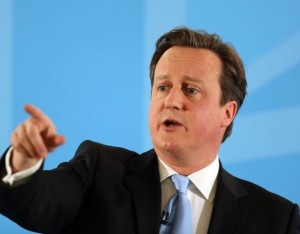UK ponders tackling corruption overseas

The UK parliament’s International Development Committee is holding a month-long inquiry into tackling corruption overseas where it is costing developing countries an estimated $1 trillion each year.
This is in preparation for British Prime Minister David Cameron’s Anti-Corruption Summit in London in May.
At the UN Sustainable Development Goals Summit in New York last September, Mr Cameron put tackling corruption at the top of his government’s development agenda.
He told the gathering: “Let’s be frank about what keeps so many stuck in poverty. Corruption. Rotten government. No access to justice. No property rights. No rule of law.”
“Today, for the first time, every country in the world is committing to tackle corruption, to promote the rule of law and access to justice, to reduce illicit financial flows and to strengthen the return of stolen assets.”
Sustainable Development Goal 16 commits signatory governments to significantly reduce illicit financial and arms flows, substantially reduce bribery and corruption and develop accountable and transparent institutions.
The inquiry is looking at the direction and effectiveness of the Department for International Development’s 2013 anti-corruption strategy in countries where the Department for International Development (DFID) is working although it has received criticism in the past for not doing enough to deal with the menace.
The Committee is taking written evidence that deals with a number of crucial issues: “Should DFID have a zero tolerance policy towards corruption in the countries where it is working or is a more nuanced approach needed to tackle corruption over the long-term?
“How can DFID manage the risks associated with corruption and reconcile them with its value-for-money agenda?”
Crucially, the Committee wants to know how to strike a balance between tackling corruption top down at institutional level and bottom up at the grass roots.
Conceding that “corruption and poor governance can be a key cause of instability in fragile states”, the inquiry wants to know whether “the government [is] appropriately prioritising and managing anti-corruption strategies in these settings”.
The Committee added: “[Corruption] can have a devastating effect on a country’s democratic system, economy, civil society and the provision of public goods and services.
“It is also a very complex problem to tackle, often embedded in social norms with numerous groups and actors involved.
“Rule of Law, local ownership, governance, taxation, and private sector behaviour in a global marketplace all have an impact, so efforts to tackle corruption require significant coordination and a comprehensive understanding of the context.”
The Committee is also looking into thorny issues such as beneficial ownership, tax havens, illicit flows and the arms trade and how the UK government could tackle these in order to limit the effects of corruption on developing countries.
Beneficial ownership is a legal term where specific property rights in equity belong to a person even though legal title of the property belongs to another person.
The UK government has in the past come in for criticism by anti-corruption watchdogs such as the Washington-based Global Financial Integrity (GFI) for being rather slow in dealing with beneficial ownership and tax havens that are used as tax evasion mechanisms.
GFI’s mission statement notes: “More money flows illegally out of developing and emerging countries each year—facilitated by secrecy in the global financial system—than they receive in foreign direct investment and foreign aid combined.
“Beyond bleeding the world’s poorest economies, this propels crime, corruption and tax evasion globally.”
The parliamentary inquiry will also look the UK’s domestic anti-corruption policy and practice and whether there is a coherent government strategy to combat corruption in developing countries.
Last month, a small British printing company, Smith & Ouzman Ltd, was fined £2.2 million for making corrupt payments of about £400,000 to public officials in Kenya and Mauritania in exchange for contracts to print ballot papers.
It became the first UK company to be convicted for overseas bribery but legal experts pointed out that this was “in part due to the fact that as a small, family-owned printing company, corporate attribution was easier to establish than it would have been in the case of a larger corporate”.
They also criticised the UK government for shelving plans to review a section of the Bribery Act 2010 to see whether it should be extended to encompass a wider range of economic crimes.
Source: GNA
